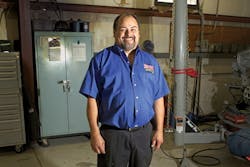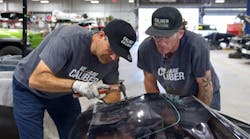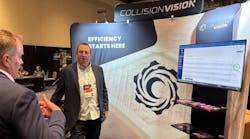When Mark Torres entered the collision repair industry to work with his brother in the 1980s, he was shocked to learn there was little else required of him beyond on-the-job training.
“This trade that I love is missing certification for what we do,” says Torres, who owns Tehachapi Collision Center in Tehachapi, Calif. “I knew at that point that that was something I wanted to pursue.”
Torres has since begun teaching I-CAR classes, pursued teaching credentials from the state, and even taught collision repair to California prisoners.
He is now taking his deep passion for collision repair and education to new heights. In January, he launched a class in his body shop. Each week, high school students from a local charter school come to his shop, where Torres spends two hours teaching them about collision repair.
Location: Tehachapi, Calif.
Square footage: 11,000
Employees: 8
Annual revenue: $1 million
Average repairs per month: 40
His efforts have sparked new interest in the industry, formed community relationships, and impacted the lives of young people. Torres even has his eyes on a couple of top students as employee prospects.
“I thought it was a bad thing that the public school system was doing away with automotive and wood shop classes. Not all kids are into academics,” he says. “I wear my wife out, I think so much. I’m always thinking about the industry or classes. It’s my life.”
An Early Start
Torres’ passion for the industry dates back to his childhood; he used to put Tonka trucks in spray booths at his dad’s shop.
“This industry is very challenging, and I like that challenge. I like to try to make things work. I think that’s what draws most of us to the industry. There are days I go home and think, ‘Man, I don’t know.’ It’s kind of crazy, but after doing this trade for so many years, I still love wrecked cars. I love them. It’s intriguing to me how they can get wrecked, and how we can fix them,” he says. “I think once one challenge gets easier, there’s a new one put in place. We constantly have obstacles put in our way. We just have to overcome them. If you can’t jump the hurdle, walk around it.”
One obstacle the industry has always faced is where to get the highest quality, up-to-date training. That issue haunted Torres from the beginning of his career. In 1995, he went to his first I-CAR class. “I thought, ‘This is the coolest thing I’ve ever done,’” he says. His career path began unfolding in front of him.
The next year he sought teaching credentials from the state of California so he could teach auto body and refinishing at vocational schools. That year he landed a job teaching collision repair to inmates at the California Department of Corrections. In 1998, he also began instructing I-CAR classes part-time, all while he was teaching twice per week at a nearby technical college.
“I’m always exploring different avenues,” he says.
New Ideas
After years of juggling multiple teaching jobs, Torres grew exhausted. While traveling for I-CAR, he fell asleep at the wheel and hit a telephone pole in the middle of a desert.
“It was a tiring time. It was a good time, but I could see the writing on the wall,” he says.So in 2006 he resigned from the California Department of Corrections and began traveling and teaching full-time for I-CAR.
Long days and frequent absences got to his marriage, though, and he knew he would soon need another change. He pulled back on I-CAR teaching and, in October 2009, he opened his own collision repair shop.
“I took every dime I had and opened this place,” he says. “There’s 40,000 people and only one other major body shop in Tehachapi. I’ve always thought we needed competition up here. It was a natural move.”
Torres hasn’t stopped brainstorming about collision repair and teaching. He thought it was important to keep shop classes in schools, and often complained about their disappearance to friends and customers in casual conversation.
Like his other ventures, his passion turned into a tangible idea. One customer revealed that his wife was on the board of Valley Oaks Charter School, which happens to be one street away from the shop. In late 2011, school officials were talking about adding vocational classes, and this customer wondered if he could connect Torres with his wife.
“That was it,” Torres says. “Six months later, Tom Karnes [assistant principal and math teacher] from Valley Oaks called me and said, ‘We got approval, are you still interested?’ We had 30 days to put this class together.”
Big Benefits
Torres says putting the class together was easy. He used I-CAR curriculum that introduces students to collision repair, and he hauled in a 2002 Daewoo from his back yard for students to work on.
The school started advertising the class, which required a minimum of five students to proceed. In no time, 14 signed up, nearly half of them female.
On Mondays and Thursdays, from 3 p.m. to 5 p.m., the Daewoo sits in the corner of the body shop, where students tear it down to nothing and put it back together. Torres’ manager and receptionist know he can’t be bothered during that time, but the shop’s employees have no trouble keeping business humming.
Torres says a lot of old-timers in the industry resist I-CAR, and yet very few techs are entering the field. “We need to start digging deep to find entry-level techs,” he says.
He thinks other shops could do something like this. Not only is it good for the kids, but it can also benefit shops.
“I think I’m on to something. If shops look outside the box, it’s a good thing,” he says. “I’ll be honest with you, we’re looking at picking the cream of the crop. We’ll give them positions and bring them up our way.”
He spent maybe a couple of hundred dollars in tools, but he can use it as a tax write-off at the end of the year. He also gets paid $32 an hour from the school.
“That’s not why I did it,” he says. “That was a bonus.”
He also made sure that parents saw what kinds of things their kids would be doing each week. He gave them a tour and explained what he’d be teaching. Parents bought safety equipment such as glasses, earplugs, and a respirator. Coveralls were recommended. So far, he’s gotten a lot of positive feedback from parents.
Karnes, assistant principal and math teacher at the charter school, says it’s working out very well. Parents and school officials love his enthusiasm, and Torres has the perfect background for this.
“He’s a definite plus to our little community,” Karnes says.
Students like Lauren Grisson, 17, love Torres’ class. The high school senior says her favorite part about it is taking apart cars and putting them back together. It can be difficult work; she remembers one long and frustrating day when a door would not fit back on the car. But eventually it all came together.
“It actually worked like (Torres) said it would,” Grisson says. “It’s one of those things I never thought I’d be able to do.”
She has her heart set on studying marine biology after graduation, but if she didn’t do that, collision repair is now high on her list of possible careers.
“It’s such a fun class,” Grisson says. “I like that it’s not just all online, all papers. We actually get to do the real thing.”
As for Torres, he says this will hopefully help move the industry forward, or at least his shop. It’s another fun challenge for him to take on, too.
“I believe that no matter what you do, if the job you’re doing is no longer challenging and keeps your brain active, you need to advance to the next level and challenge yourself,” he says.



